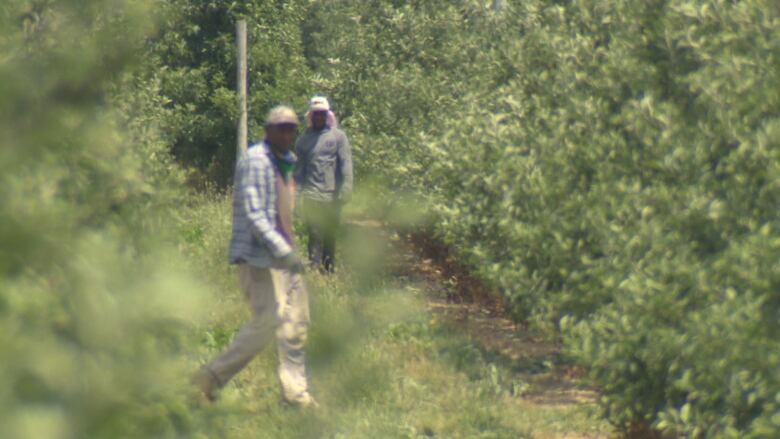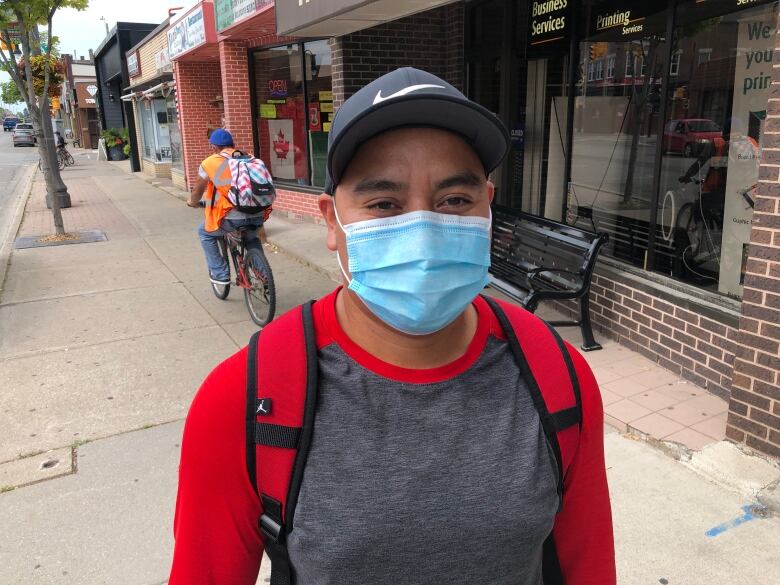Ottawa 'remotely' inspected Ontario farms while COVID-19 infected hundreds of migrant workers
3 migrant labourers have died in Ontario after contracting novel coronavirus

The federal government has conducted mostly remoteinspections of Ontario farms that employ migrant workers during the COVID-19 pandemic, instead of physically entering theproperties to make sure the labourers' living conditions are safe.
Employment and Social Development Canada, the department responsible for the inspections, told CBC News that over the last four months, allthe farms it inspected duringthe initial 14-day mandatory quarantine period complied with the rulesas of June 12.
But the department admittedin most cases, inspectors didn't actually travel to the farms in question.
"For the safety of everyone involved, the majority of inspections are still being conducted remotely," the department said in a statement.By some accounts, theinspections are donevirtually. CBC News has asked for details on how the remote monitoring is conducted, but so far, the department has not provided details.
The inspections have been happening asCOVID-19 has infected hundreds of migrant farm labourersin Ontario. By last week, three workers had already died. There have been outbreaks in St. Catharinesand in Norfolk County, but the majority have been in the Windsor area forcing the province to expand testing for the novel coronavirus in the region.
Ottawa, which is responsible for checking the bunkhouses where the workers stay, confirmed some in-person inspections started up again last week in the Windsor-Essex area.
But that was too little, too late, according to Syed Hussan,executive director of an advocacy group called theMigrant Workers Alliance for Change.
"The fact [the inspections]were cancelled in the beginning was the wrong decision," Hussan told CBC News.
"Three workers are dead and only now are we seeing some minor changes but none of them to the scale which we need them."
'It's scary'
Some labourers from farmsin Leamington, Ont., in the Windsor area, say they are nervous the virus is spreading among migrant workers.
"It's scary to become infected so we're always nervous," said Israel, a Guatemalan labourer who works on a tomato farm. He would only tell CBC Newshis first name.
However, he said his employer has ensured workers are physically distancingandfollowingsafety protocols.
"We feel safe on the farm," he said. "There's few people in the houses. We wash our hands before and after work."
Unions also raised concernswhen a CBC News investigation found the province was doing inspections of long-term care homes by phone before determining no problems existed.So far, about 70 per cent of all COVID-19 deaths have been residents in long-term care, and many say the virushasshed light on a system that has long failed them.
Meanwhile, advocates say the pandemic is doing the same with migrant workers.
"COVID-19 has magnified, but also is exacerbating the current crisis," said Syed.

The government of Premier Doug Ford ispartnering with the federal government to conduct concurrent inspections.
In addition to monitoring living conditions for the workers, Ottawa is responsible for making sure farms comply with immigration regulations and rules governing the workers' contracts.Meanwhile, the province checksfarms are obeying labour laws,tellingCBC News it has conducted 241 in-person and 62 remote inspections sinceMarch 11.
'Risking their lives'
Under new rules brought in earlier this year, the federal government mandated employers to pay the workers for their two weeks of quarantine and made sure farms allowed labourers to stay in isolation for the entire 14-day period.
A farm employer could face penalties of up to a $1 million and be bannedfrom hiring foreign workers, in some cases permanently.
The federal government said it launched 1,066 investigations of which 703 have been completed between March 1 and June 24. It did not say how many were found non-compliant.
ButSyed said the inspection regime is flawed, pointing to the fact the government did not find any employers non-compliant in the initial quarantine period.
A report the group released in June documented inadequate housing and said some workers were notbeing paid during the quarantine period.
The Migrant Workers Alliance for Change has been pushing Ottawa to grant migrant workerspermanent residency so they are able to voice concerns without fear of reprisal.
"People are coming halfway around the world, risking their lives, their livelihoods," said Syed.












_(720p).jpg)


 OFFICIAL HD MUSIC VIDEO.jpg)
.jpg)



























































































